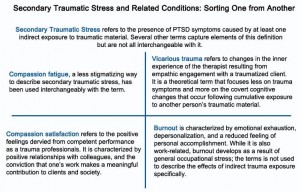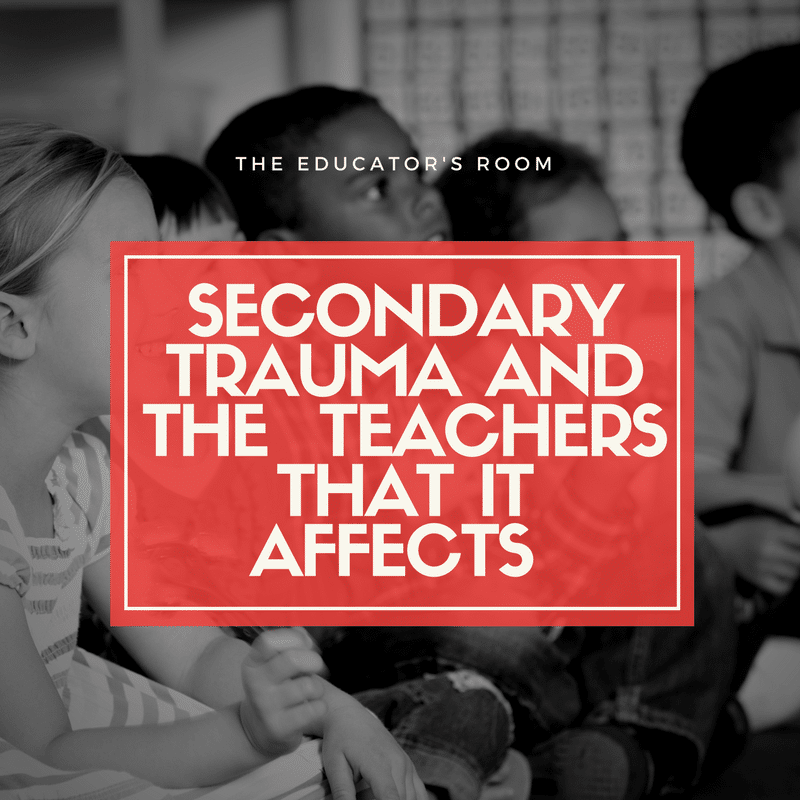It is 30 days into the school year. So far I have listened to or read stories about my students experiencing homelessness, bullying, deaths of family members, suicidal thoughts, and sexual abuse. These traumatic events weigh down on our students. Unfortunately, as we know, our schools do not have enough mental health supports. If we have social workers, psychologists, or guidance counselors, they’re often overworked. Meanwhile, as their teachers and caretakers, we may also be experiencing a form of trauma without realizing it. It is called secondary trauma. As we advocate for more support for our students we must also advocate for ourselves by recognizing this form of trauma.
What is Secondary Trauma?
Secondary trauma is defined by The National Child Trauma Stress Network (NCTSN) as “the emotional duress that results when an individual hears about the firsthand trauma experiences of another.” Secondary trauma often affects caregivers such as social workers and therapists. However, for a number of reasons, teachers may be exposed to secondary traumatic stress as well. Perhaps they are teachers who work in schools without social workers or guidance counselors, so they are forced to fill in that gap. Or maybe just as a result of natural relationship and trust building, students choose to share a traumatic story. In either situation, it seems logical that teachers may be experiencing secondary trauma.
Furthermore, according to NCTSN, “Risk is also higher for professionals who carry a heavy caseload of traumatized children; are socially or organizationally isolated; or feel professionally compromised due to inadequate training.” Underprepared, stressed, and socially isolated? These words apply to far too many teachers, particularly those working in communities where risk factors for trauma are high.
Some of the symptoms of secondary trauma include:


We must acknowledge the mental weight that teachers carry from the emotional labor of our jobs. And we must do better to provide teachers tools and supports to deal with their secondary trauma.
Supports for Secondary Trauma
One way to start is by breaking the silence. Without compromising student privacy we need to find ways to share and process. This might require us to repurpose PD or to find the additional time.
There is a growing movement to teach mindfulness in schools to educators as well as students. Mindfulness is one strategy that could help by encouraging teachers to name the emotions they’re experiencing and recognize their physical and psychological impact.
Greater Good Magazine offers three common-sense strategies as well: Fostering positive relationships between staff members, creating an optional wellness group for teachers, and starting staff meetings with a wellness practice such as meditation or expressing gratitude to one another.
NCTSN provides this guide to self-care for educators. The Educator’s Room is deeply invested in this work. Krissa Mayhew just published a very handy guide for dealing with exhaustion, among many others on the site. The Educator’s Room will be hosting it’s second Teacher Self-Care Conference June 15 – 16, 2018. In the meantime, teachers should remember that simple things like eating healthy, getting sleep and exercise, and engaging in fun activities are not ancillary, they are central to our jobs.
We cannot take care of our students without taking care of ourselves. We cannot do our best work if we feel emotionally fatigued, closed off, or irritable.
In the long term, we can serve our students and ourselves by working to create a world that is less harmful and traumatic. To put it bluntly, social justice equals better working conditions for teachers.
In the short term, we must find a way to cope with the world as it is. As we continue to serve as trusted, supportive adults in young people’s lives we must be aware that this work can take a toll. We must find ways to strengthen and support ourselves and one another along the way.







Thank you Ruben for this article it validates a lot of what I am going through as a teacher. I am researching this topic of secondary trauma as a part of my professional goals this year. After having and currently still having harrowing experiences with teaching and my administrator I am beginning to feel more empowered knowing I am not alone and or crazy for feeling what I feel.
Amber